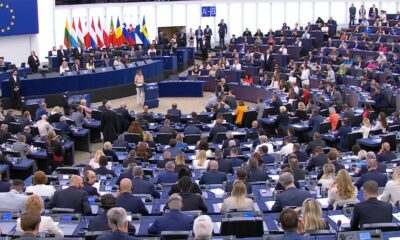Travel
Superyacht ban: Naples bans vessels over 75 metres to dismay of multibillionaires
By Charlotte Elton
This Italian port city has just banned superyachts over 75 metres. Billionaires aren’t happy.
Naples has banned superyachts, triggering a chorus of disappointment from multibillionaires.
The port of Naples has restricted entry to certain ships this summer, prohibiting vessels that exceed 75 metres in length.
Some port administrators have expressed frustration with the rule, which has been introduced for security reasons.
“There are rules and we respect them, but in this case it must be noted that the repercussions of this provision are considerable,” Massimo Luise, one of the administrators of the Mergellina pier, told Italy24.
“It is a pity for Naples, which is a special city full of culture and tradition … that it can no longer welcome guests of the calibre of Leonardo DiCaprio, Johnny Depp, Jeff Bezos and Jennifer Lopez.”
Bernard Arnault – the second richest man in the world, with a net worth of €140 billion – was one of the first to fall foul of the new regulations.
Symphony, the 101-metre-long, six-deck vessel, was left stranded in the Tyrrhenian Sea last week after the crew were told it would not be allowed to dock in the southern Italian city.
The fashion tycoon – who is the CEO of luxury goods company LVMH and co-founder of Louis Vuitton – will have to occupy himself onboard. Luckily, there’s no shortage of options, including an outdoor cinema and a glass-bottomed swimming pool.
Corriere della Sera – an Italian news organisation – reported that the media tycoon Barry Diller has also renounced Naples as a holiday destination.
The new restriction will apply for the first time this summer season.
Arnault has also sold his private jet
This is not the first time that Arnault has faced travel impediments at the hands of the less-affluent.
Last year, the French businessman sold his private jet after being tracked by Twitter climate activists.
“63 French billionaires emit as much CO2 as 50 per cent of the population,” the ‘I Fly Bernard’ account responsible for the tracking wrote.
Travel
ETIAS: The new visa Brits will need to enter the EU in 2025, what it costs and who gets it free
Travellers will need to apply online before they’ll be allowed into EU countries.
Travellers, including British tourists post-Brexit, will soon face a new hurdle when visiting Europe.
Although a launch date has yet to be announced, it’s likely the ETIAS will become official in the first half of 2025.
The European Travel Information and Authorisation System will require travellers to complete an online application, provide personal details, answer security questions and pay a €7 fee. This authorisation will be linked to the traveller’s passport and will be valid for three years or until the passport expires.
The ETIAS is separate from the new EU Entry/Exit Scheme which will also affect Brits and launches 10th November.
Flora, a Brit and mother of two young children, is among those affected by the changes.
“Traveling with kids is already challenging, and now we have to deal with extra paperwork,” Flora said. She and her partner Alexander, currently on a staycation in the UK, are frustrated by the new requirements that add complexity to travel plans.
“I was a staunch proponent of remaining in the EU, so it’s just another slightly disappointing hurdle that we’re all having to face in our ability just to feel like we can be freely part of Europe. But it’s a reality of what happened with the Brexit vote back in 2016, I suppose.”
What is ETIAS, and who will have to comply?
The European Travel Information and Authorisation System (ETIAS) is a new system that non-EU travellers will have to navigate. It is part of the EU’s efforts to improve border security.
Under the new ETIAS rules, travellers from non-EU countries will have to apply before visiting the Schengen Area, which includes most EU countries as well as Iceland, Liechtenstein, Norway and Switzerland.
Most travellers from outside the EU will need to comply with ETIAS, but there are some exceptions. The fee will be waived for children under 18 and adults over 70, although they will still need to apply for authorisation.
Additionally, there will be a grace period of at least six months when ETIAS is first introduced. This will give travellers time to adjust to the new system, but early application is recommended to avoid any travel disruption.
How will ETIAS affect British travellers?
Rob Staines, an independent travel expert, explained the impact of this change for British tourists, saying it is a reality of post-Brexit travel.
“We were asked to be deemed a third country when we left the European Union and this is extra red tape and extra layers of complexity when it comes to travel,” he said.
“But I think if we look in the grand scheme of things, it’s completely acceptable and understandable that the EU wants to strengthen their borders. But unfortunately, that comes at a cost.”
Despite these new measures, Staines believes it won’t deter British travellers from visiting Europe.
“Over 17 million Brits visited Spain last year. It’s our number one holiday destination. I don’t think this small price to pay and this extra layer of bureaucracy is actually really going to put off people traveling. If anything, it could make people want to travel to the EU more because it’s making it a safer place to go. It’s ensuring that people don’t overstay their welcome and it’s a way for the EU to protect their borders.”
“What the UK’s Labour government is doing at the moment is trying to repair those broken relationships that we have and create a better situation after Brexit,” he added.
“It’s one of those situations that we just do have to keep an eye on, but actually, yes, it’s going to make travel harder. It’s going to make travel slightly more expensive for us as well, but we don’t know what’s going to happen in the future.”
Travel
Rome wants to charge tourists to visit the Trevi Fountain – here’s why
Rome is looking at ways to curb overtourism and a ‘lack of respect’ for one of the most famous bucket list destinations in the city.
Rome could soon launch a ticketing system to enter one of its most iconic sites.
Authorities in the Italian capital say they want to start the scheme at the Trevi Fountain as part of ongoing plans to both reduce crowds and promote “sustainable tourism”.
The 18th-century fountain has long been a ‘must visit’ for tourists to the Eternal City, but it is frequently overcrowded and rife with pickpockets.
“Personally I would be in favour of looking at a new form of access, limited and timed, to the Trevi Fountain,” Alessandro Onorato, Rome’s city councillor responsible for tourism, told Italian newspaper Corriere della Sera.
If enforced, it would act as “a [ticket] reservation system – free for Romans and costing a symbolic one euro for tourists”, Onorato added.
Despite that cost, the city’s authorities say the goal of the charge is not to raise money, but to lessen and control crowds, while stopping them from “eating ice cream or pizza on a monument that deserves the proper respect.”
How likely is it that the Trevi Fountain plan will go ahead?
The fountain is one of the most visited attractions in Italy – and the wider world. That means it is frequently packed full of people who struggle to get a glance of the icon, designed by Italian architect Nicola Salvi.
While Onorato is keen to see the ticketing scheme in action, a spokesperson for the municipality told the AFP news agency that the proposal is merely “an initial idea – there is nothing concrete yet”.
“It is a delicate, difficult issue, but sooner or later it must be addressed,” the spokesperson added, “Tourism in Rome, which is reporting record numbers, must be made sustainable for the city and the environment.”
Rome sees on average 35 million visitors each year and that number is set to be higher still in 2025 as the Jubilee, a year-long religious event held in the city and the Vatican, is set to attract millions more.
Where else in Italy charges for entry – or is planning to?
If the Trevi Fountain fee did come into action, it wouldn’t be the first attempt in Italy to control crowds.
Earlier in 2024, Venice trialled a €5 ticket for day visitors arriving during peak periods, with the aim of encouraging people to come at less busy times. The trial had mixed responses from authorities and locals, but is likely to be repeated in 2025’s peak season.
Earlier this week, it was also announced that prime minister Giorgia Meloni’s government is considering raising Italy’s tourist tax to tackle overcrowding in busy cities, including Rome and Florence.
If that goes ahead, visitors staying in local accommodation overnight will have to pay up €25 (£21) a night per person.
That proposal has been met with anger by some leaders in hospitality, with a number suggesting it will damage the industry and put many people off visiting Italy altogether.
In the same vein, Onorato told the Corriere della Sera that authorities in Rome would ideally like to limit the opening of new Bed And Breakfast accommodation and holiday homes in order to reduce the pressure on the city’s historic centre.
Currently, though, they don’t have the power to do so: “Today we can limit the number of restaurants or fast-food outlets in the historic centre, but we cannot prevent the opening of non-hotel facilities.”
Travel
New EU travel rules for tourists: What changes in 2025?
The new rules require travellers to complete an online application, provide personal details, answer security questions and pay a €7 fee.
Starting in 2025, travellers, including British tourists post-Brexit, will face new rules when visiting Europe.
Flora, a Brit and mother of two young children, is among those affected by the changes.
“Traveling with kids is already challenging, and now we have to deal with extra paperwork,” Flora said. She and her partner Alexander, currently on a staycation in the UK, are frustrated by the new requirements that add complexity to travel plans.
“I was a staunch proponent of remaining in the EU, so it’s just another slightly disappointing hurdle that we’re all having to face in our ability just to feel like we can be freely part of Europe. But it’s a reality of what happened with the Brexit vote back in 2016, I suppose.”
What is ETIAS, and who will have to comply?
The European Travel Information and Authorisation System (ETIAS) is a new system that non-EU travellers will have to navigate. This requirement is part of the EU’s efforts to enhance security at its borders.
ETIAS requires travellers to complete an online application, provide personal details, answer security questions and pay a €7 fee. This authorisation will be linked to the traveller’s passport and will be valid for three years or until the passport expires.
Under the new ETIAS rules, travellers from non-EU countries will have to apply before visiting the Schengen Area, which includes most EU countries as well as Iceland, Liechtenstein, Norway and Switzerland.
Most travellers from outside the EU will need to comply with ETIAS, but there are some exceptions. The fee will be waived for children under 18 and adults over 70, although they will still need to apply for authorisation.
Additionally, there will be a grace period of at least six months when ETIAS is first introduced. This will give travellers time to adjust to the new system, but early application is recommended to avoid any travel disruptions.
How will ETIAS affect British travellers?
Rob Staines, an independent travel expert, explained the impact of this change for British tourists, saying it is a reality of post-Brexit travel.
“We were asked to be deemed a third country when we left the European Union and this is extra red tape and extra layers of complexity when it comes to travel,” he said.
“But I think if we look in the grand scheme of things, it’s completely acceptable and understandable that the EU wants to strengthen their borders. But unfortunately, that comes at a cost.”
Despite these new measures, Staines believes it won’t deter British travellers from visiting Europe.
“Over 17 million Brits visited Spain last year. It’s our number one holiday destination. I don’t think this small price to pay and this extra layer of bureaucracy is actually really going to put off people traveling. If anything, it could make people want to travel to the EU more because it’s making it a safer place to go. It’s ensuring that people don’t overstay their welcome and it’s a way for the EU to protect their borders.”
“What the UK’s Labour government is doing at the moment is trying to repair those broken relationships that we have and create a better situation after Brexit,” he added.
“It’s one of those situations that we just do have to keep an eye on, but actually, yes, it’s going to make travel harder. It’s going to make travel slightly more expensive for us as well, but we don’t know what’s going to happen in the future.”
-

 Sports5 days ago
Sports5 days agoMercedes celebrates Monza: “Goosebumps.”
-

 Sports4 days ago
Sports4 days agoCharles Leclerc at Monza outperformed even Michael Schumacher.
-

 Politics6 days ago
Politics6 days agoEuropean Parliament begins its 10th term
-

 Sports4 days ago
Sports4 days agoUS Open, Jannik Sinner sweeps Tommy Paul in three sets: he’s in the quarters
-

 Health & Society3 days ago
Health & Society3 days agoDoctors are not trained in how to discontinue psychiatric drugs
-

 Sports4 days ago
Sports4 days agoMilan: Ismael Bennacer does not leave, Adrien Rabiot does not arrive
-

 Sports4 days ago
Sports4 days agoNo one like Jannik Sinner in the Slams, but now there’s Daniil Medvedev
-
EU & the World4 days ago
Adele Announces ‘Incredibly Long’ Hiatus After Las Vegas Residency Ends









